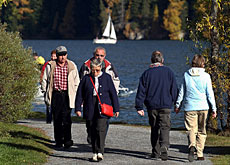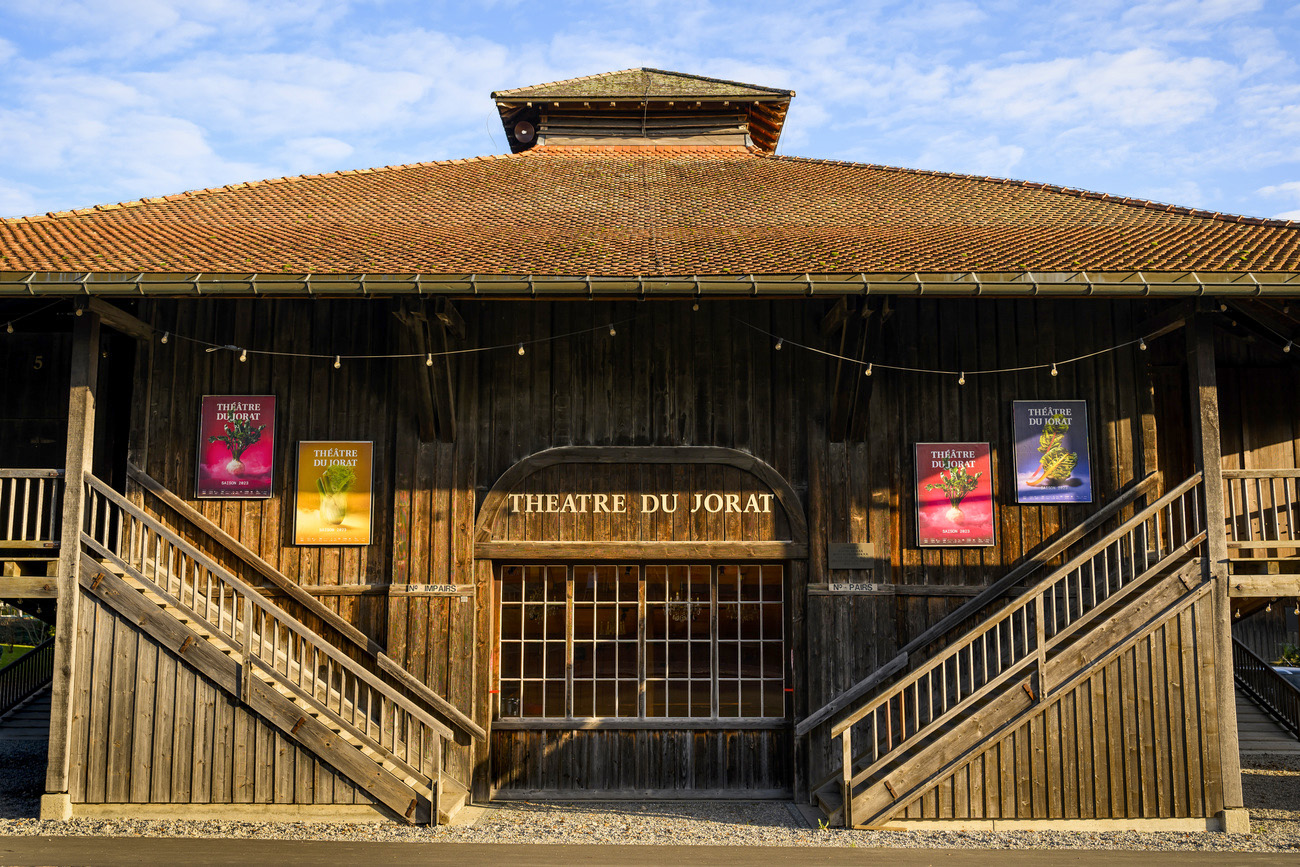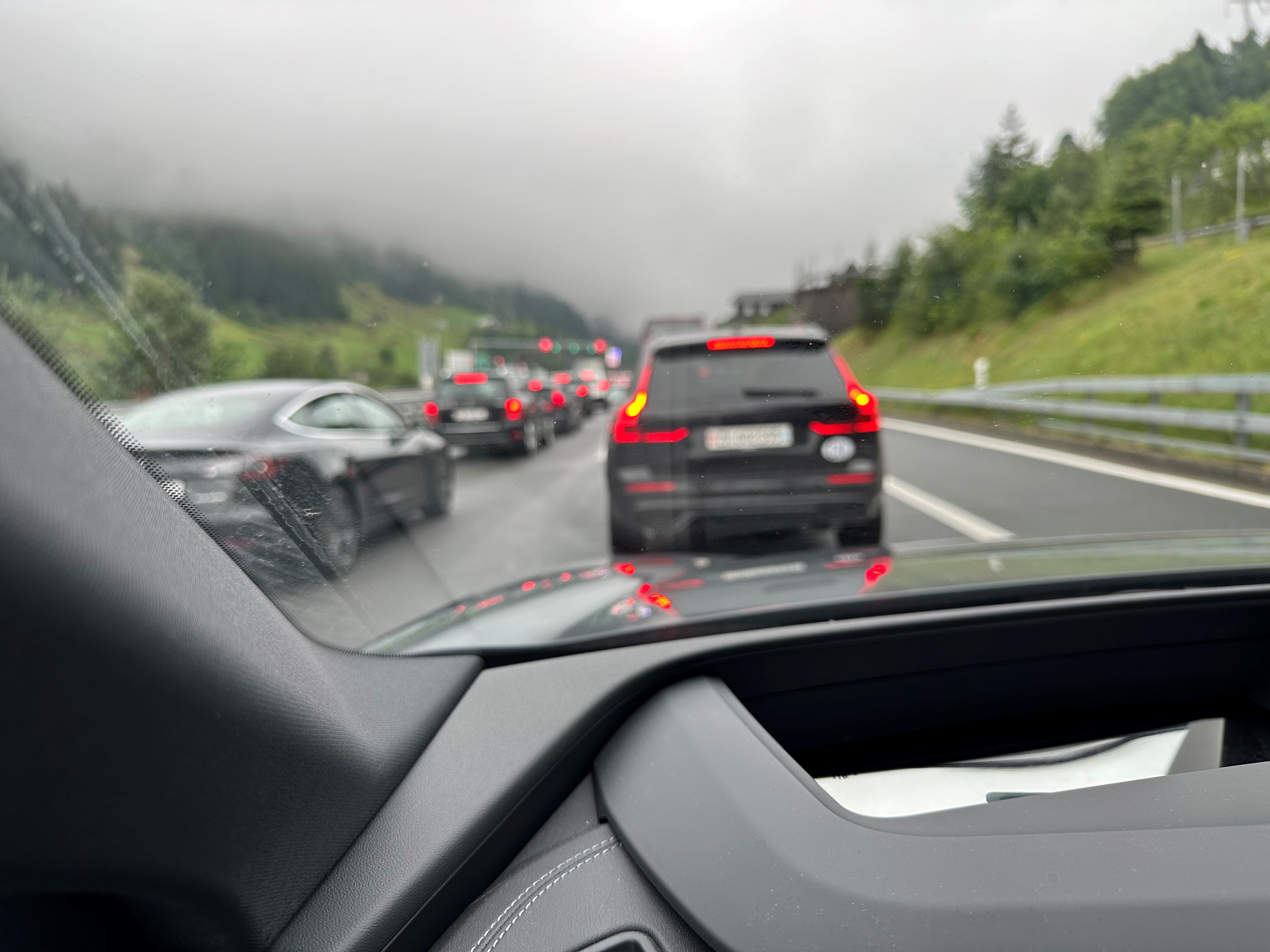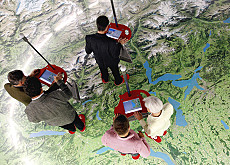
Campaigners want public access to all waterways

Millionaires may have to open lakeside footpaths in front of their luxury lakeside properties – that is if a Swiss lobby group gets its way.
Rives Publiques is battling to make Switzerland’s lakeshores and riverbanks accessible to the public. After a recent victory on Lake Zurich, it issued a nationwide ultimatum earlier this week to local authorities and lakeside landowners.
The group has given them two years to return the waterfronts to the general public who, it claims, are entitled to a minimum 3-5 metre wide footpath from the waterside, in accordance with Swiss laws.
“I believe the waters of Switzerland belong to everybody and the shores are part of them – that’s what the Civil Code says very clearly,” Victor von Wartburg, the president and founder of the Rives Publiques association, told swissinfo.
It is estimated that only 50 per cent of the shores of lakes Zurich, Geneva and Constance are accessible to ramblers.
Von Wartburg, a retired businessman who lives in Mies, canton Vaud, has spent the past four years, together with experts and lawyers, trawling through the complex legal minefield governing access to Swiss lakes and rivers.
Convinced of their watertight legal argument, he says local authorities rarely apply the complex body of laws to return what has been “confiscated” by private landowners.
“I’m against the fact that local authorities and the wealthy don’t respect the laws; they’ve sewed it up together so that it becomes practically impossible to break this boycott.”
His strong motivation is partly based on bad experiences boating on Lake Geneva.
“When looking for places to land for a picnic, swim or walk we were chased away by dogs, owners or their employees – in one case with a hunting rifle,” he said.
Legal arguments
Daniel von Siebenthal, president of canton Vaud’s lakeshore commission, said the legal framework to force private owners to open footpaths was clear but only consisted of general measures.
“It’s long and difficult – but not impossible [to build footpaths],” he added.
According to Raimund Rodewald, head of the Swiss Foundation for Landscape Protection, the problem is partly due to the federal structure.
“Each canton has its own laws and principles. The federal state can only give principles that are for the cantons and communes to apply – so in the end there is no control or responsibility.”
In 2000 canton Vaud adopted a plan to make Lake Geneva’s shorelines accessible to the public but seven years later less than one kilometre of new lakeside paths had been built.
Von Siebenthal pointed the finger at the communes for dragging their feet.
“It’s not their priority; it’s a difficult job, as you have to negotiate with the owners, even if there is a registered public right of way,” he said.
“Not really realistic”
But Gérald Cretegny, the mayor of Gland commune on Lake Geneva, has rejected the accusations.
“We have been working on this subject for years. It’s important that the population has access to a large part of the lakeside. But private landowners have rights as well and two years is not really realistic. The current laws do not allow us to demand owners to make these zones public,” he said.
Critics say the authorities don’t have the courage to tell the Bertarellis and the Schumachers of this world that they are going to install a footpath, especially as they risk losing valuable tax money.
Rives Publiques therefore intends to put pressure on local authorities and owners in canton Vaud by opposing all new or renewable concessions. It also has several ongoing appeals at the Federal Court.
“We are working on door-openers. If we aren’t successful, we will go to the European Court of Justice in Strasbourg,” insisted Von Wartburg.
swissinfo, Simon Bradley
According to a recent survey, 61.4% of Swiss people want unrestricted access to the lakeshores. This figure rises to 71.6% in French-speaking regions, compared with 58% in German-speaking areas and 80% for young people.
According to Rives Publiques, the public right of way around Swiss lakes is governed by a complex series of federal and cantonal laws and rulings, but Swiss Civil Code cannot be overruled.
In June 1982 the people of canton Bern voted in favour of an initiative for public access to its lakes and rivers. But the law is only poorly implemented.
Only 50% of the shores of lakes Zurich, Geneva and Constance are said to be accessible to ramblers. Lakes Biel and Thun have sections of the shoreline which are accessible to the public.
Lake Neuchâtel serves as a model to others. A shoreline path exists from Marin-Epagnier to the canton Vaud border.
The association celebrated victory in Uetikon on Lake Zurich when local people voted against a SFr300-million lakeside development project.
On Lake Geneva the association is opposing a project in the picturesque village of Rolle, the extension of a 30-year concession of the port of billionaire Ernesto Bertarelli’s mansion in Crans-près-Céligny and of a port owned by the European football association, Uefa, which has its headquarters in Nyon.
It has filed an appeal with the administrative court over the newly planned Fine Arts Museum in Lausanne.
It also has its sights on a future demand for a concession for a harbour project by former motor-racing champion Michael Schumacher, who has built a house on the shores at Gland.
Three appeals are also pending at the Federal Court – one concerning a development plan at Von Wartburg’s home village of Mies and two others regarding Uetikon am See.

In compliance with the JTI standards
More: SWI swissinfo.ch certified by the Journalism Trust Initiative






































You can find an overview of ongoing debates with our journalists here . Please join us!
If you want to start a conversation about a topic raised in this article or want to report factual errors, email us at english@swissinfo.ch.